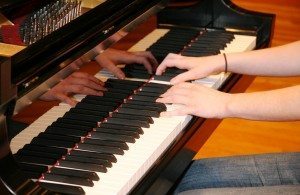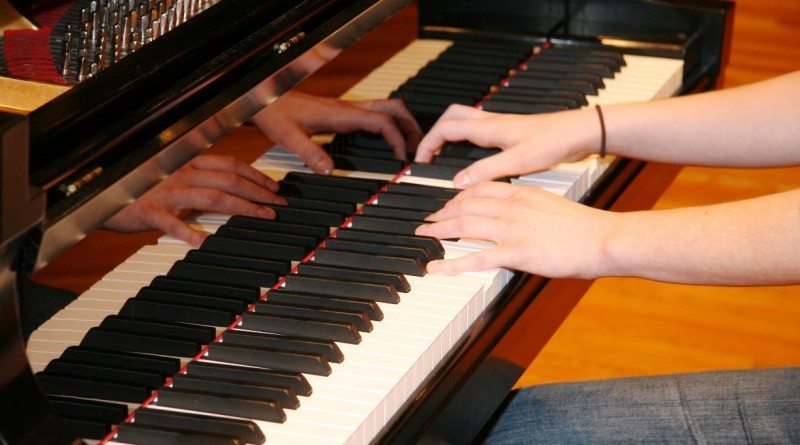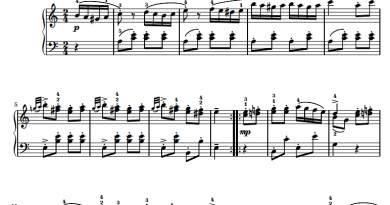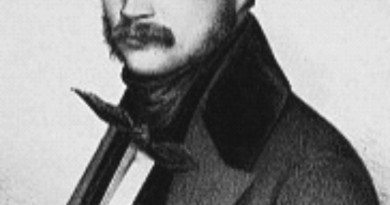Robert Schumann : how to study music and piano
Rules and maxims for young musicians
- The cultivation of the ear is of the greatest importance.
Endeavor, in good time, to distinguish tones and keys: the bell, the window-shutter, the cuckoo try to find out in what key are the sounds these produce. - You must industriously practice scales and other finger exercise.
There are people, however, who think they may attain to everything in doing this until a ripe age they daily practice mechanical exercises for many hours. That is as reasonable as trying to pronounce a, b, c, quicker and quicker every day. Make a better use of your time. - “Dumb keyboards” have been invented; practice on them for a while, in order to see that they lead to nothing. We cannot learn to speak from dumb people.
- Play in time: The playing of some virtuoso resembles the walk of a drunken man. Do not make such your models.

How to study piano music according to Schumann
- Learn the fundamental laws of harmony at an early age.
Do not be afraid of the words, theory, thorough bass, counterpoint, etc, they will appear friendly enough to you when yon are familiar with them. - Never strum! Play carefully always and never try a piece half through.
Dragging and hurrying are equally great faults. - Try to play easy pieces well; it is better than to play difficult ones in a mediocre style.
- Take care that your instrument is always in perfect tune.
- It is not enough to know your pieces with your fingers; you should be able to remember them to yourself without a piano. Sharpen your powers of fancy, so that you may be able to remember correctly, not only the melody of a composition, but its proper harmonies also.
- Try to sing at sight, without the help of an instrument, even if you have but little voice; your ear will thereby gain in fineness. But if you possess a powerful voice, do not lose a moment, but cultivate it immediately and look on it as the beat gift Heaven has borrowed on you.
- You should be able to understand a piece of music merely on reading it.
“When you play, do not trouble yourself as to who if listening.
Yet always play as thought a master listened to you. - If anyone places a composition, with which you are unacquainted before you, in order that you should play it, read it over first.
- If you have finished your daily musical work, and feel tired, do not force yourself to further labor. It is better to rest than to practice without pleasure or freshness.
- When you are older, avoid playing what is merely fashionable.
Time is precious. If we would learn to know only the good things that exist, we ought to live a hundred human lives. - No children can be brought up to healthy manhood on sweetmeats and pastry. Spiritual, like bodily nourishment must be simple and strong. The masters have sufficiently provided for this, hold to it.
Tips for young pianists or musicians
- Executive passages alter with the times; flexibility is only valuable when it serves high aims.
- You should not aid in the circulation of bad compositions, but on the contrary, in their suppression, and with all your power.
- You should never play bad compositions and never listen to them when not absolutely forced to do so.
- Do not try to attain mere technical facility, the so-called bravura. Try to produce the same impression with a composition, as that which the composer aimed at; no one should attempt more, anything beyond it is mere caricature.
- Look upon the alteration or omission of modern ornaments, in the works of good composers as a contemptible impertinence. This is perhaps the greatest injury that can be offered to art.
- Question older artists about the choice of pieces for study. You will thus save much time.
- You must gradually learn to know all the most remarkable works by all the most remarkable masters.
- Do not be led astray by the applause bestowed on great virtuosos. The applause of a master should be dearer to you than that of the masses.
All that is fashionable again becomes unfashionable; and if you cultivate fashion until you are old, you will become an imbecile, whom no one can respect. - Playing in society is more injurious than useful. Study your audience; but never play anything of which you feel ashamed in your own heart.
- Lose no opportunity of playing music, duos, trios, etc., with others. This will make your playing broader and more flowing. Accompany singers often.
Rules and maxims to study music
- If all were determined to play the first violin, we should never have a complete orchestra. Therefore, respect every musician in his proper place.
- Love your instrument, but do not vainly suppose it the highest and only one. Remember that there are others equally fine. Remember also, that there are singers, and that the highest expression possible to music, is reached by chorus and orchestra.
- As you grow older, converse more with scores than virtuosos.
- Practice industriously the fugues of good masters ; above all, those of J. S. Bach.
The ” Well-tempered Piano-forte” should be your daily bread. You will then certainly become an able musician.
Seek among your comrades for those who know more than you do.
Rest from your musical studies by industriously reading the poets. Exercise often in the open air! - A great deal is to be learned from singers and songwriters. But do not believe everything they tell you.
- People live on the other side of the mountain, too. Be modest! You never thought of, or invented anything that others had not already thought of or invented before you. In addition, even if you had done so, you should consider it a gift from above which you ought to share with others.
- The study of the history of music and the hearing of master-works of different epochs will most speedily cure you of vanity and self-adoration.



